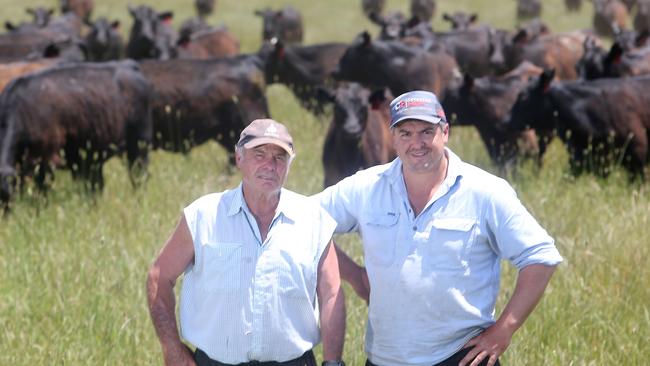Cattle prices 2023: Big price falls define a wild year for beef producers
Few cattle producers could have predicted the massive dive in prices that defined this year, but sentiment is shifting. Here’s why.
If the beef industry was a fairground ride, then 2023 would be a roller coaster for cattle producers.
While many thought the worst had happened when weaner prices were down by hundreds of dollars in January, it was just a taste of things to come.
Early in the year, Meat and Livestock Australia released its cattle projections with the sobering news that the benchmark Eastern Young Cattle Indicator would fall to 811c/kg carcass weight by June.
It was a slap for producers given the market had already come back from its peak of 1192c/kg a year earlier, and was sitting at about 905c/kg at the time.
In retrospect, that figure was more than optimistic because by the middle of June, the EYCI slid to 557c/kg and the price fall hadn’t stopped then.
The EYCI dived to just 351c/kg in early October before rain delivered a change in sentiment for a much craved late season rally for prices.
Elders Albury and Holbrook manager Matt Tinkler said agriculture worked in cycles and this year had been one of them for cattle producers. But recent rain in northern NSW and Queensland had revived the market, which had been buckling under a weight of numbers.
“I think what the rain has done is give clear air to the market,” Mr Tinkler said.
“We were struggling with a log jam of stock and this rain has created free flow, and restockers have been able to sell and then buy in again.”
MLA global analyst Tim Jackson described the cattle market this year as “turbulent”.
“The market fell from this year, falling from near-record highs to lows last seen a decade ago, before rebounding at a rapid pace with the arrival of unexpected rain across the east coast,” Mr Jackson said.
“Looking forward, the United States cattle herd is at its smallest in 70 years and American beef production will fall.
“This will give exporters and industry as a whole a fantastic opportunity to build market share and boost exports as our production continues to lift.”

Cattle producer Rodda Manning of Davilak Pastoral at Mansfield said some of the biggest market influencers were frustrating.
“There were three things that made this year difficult – rising interest rates, the falling cattle market but mostly the forecast of El Nino,” he said.
“It was frustrating to prepare for a dry year – we bought in fodder – only to have a great autumn, wet winter and terrific spring.
“The Bureau of Meteorology could not have got it any more wrong. The lack of accuracy in weather forecasts was the hardest thing we had to deal with this year and it could have cost agriculture billions.”




